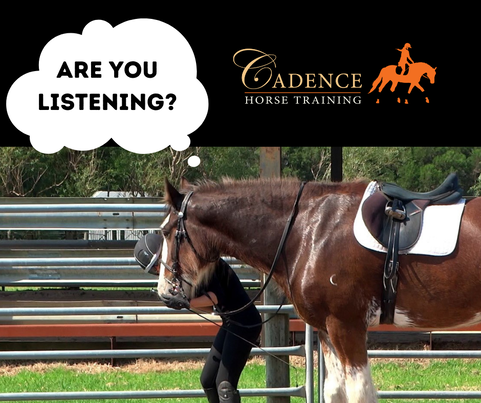|
🐴 ARE YOU LISTENING? 🐴 As a rule, horses are non-confrontational, given the option of fight or flight they will usually choose flight or remove themselves from a situation, fighting back only if they feel trapped or have learned to become defensive through previous experience or association. In addition to avoiding confrontation, horses are generally a fairly tolerant species, hence our ability to teach them, as a prey animal, to carry a rider and perform tasks out of the norm for them. Usually if a horse feels the need to fight back they will indicate their intentions first, using a facial expression or the raise of a foot. These signs may be subtle, so if we plan to work with horses or build our relationships it’s our job to listen to their communication and learn their language. Sometimes we can be a little wrapped up in ourselves and only notice a behaviour when it begins to affect us adversely or interfere with our training sessions, at this stage the behaviour may be magnified or escalated. So how can we better listen to our horses? Some more subtle signs of discomfort in a situation might be:
🐴Turning away when haltered 🐴Clenching teeth when bridling 🐴Moving away when saddled or girthed 🐴Refusal to move 🐴Pawing 🐴Chewing (ropes, reins etc.) 🐴Nipping 🐴Laying the ears back These are situations where we might feel the need to ‘correct’ these behaviours. A good alternative to this approach is to acknowledge this discomfort, if your horse is comfortable with touch lay a hand on the shoulder or neck or scratch the wither, remove pressure and allow your horse to let down or release. This can be repeated until signs of discomfort have ceased. Tackling these types of issues in this manner harbours a trusting relationship where your horse is respected and therefore more likely to show willingness in their work and are comfortable spending time in your company. The opposing view would be that this would reinforce the issues outlined above, in essence telling the horse that these behaviours are acceptable or desired. I have not found this in any way to be the case and in fact would argue that ignoring what your horse is trying to tell you quietly, leads to yelling, in the form of escalating and potentially more dangerous behaviours. If you are in any doubt, I would ask that you try it, just for a week or even a day, you might be surprised at how much your horse wants to offer you! Happy Horsing! - Cadence Horse Training |
CADENCE HORSE TRAININGStriving to maintain an encouraging and inclusive culture among fellow equestrians. We're passionate about all things equine including behaviour, biomechanics, training and horsemanship! Archives
December 2021
Categories |

 RSS Feed
RSS Feed